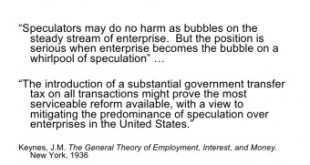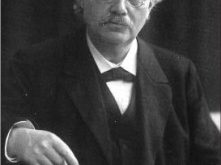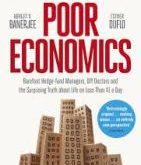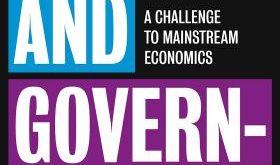Tobin tax — could it work? Eigentlich müsste es die Finanztransaktionssteuer – zumindest in Europa – längst geben: Das EU-Parlament stimmte zweimal für eine solche Steuer, und in Umfragen wünscht sie sich eine Mehrheit der Befragten. Die erste Idee dazu hatte John Maynard Keynes im Jahr 1936; populär machte sie in den Siebzigerjahren der Nobelpreisträger James Tobin und in den Neunzigerjahren das Bündnis Attac. Nach der Finanzkrise galt die Steuer im...
Read More »Why economists failed to predict the financial crisis
Why economists failed to predict the financial crisis [embedded content]
Read More »The origins of MMT
The origins of MMT Many mainstream economists seem to think the idea behind Modern Monetary Theory is new and originates from economic cranks. New? Cranks? How about reading one of the great founders of neoclassical economics – Knut Wicksell. This is what Wicksell wrote in 1898 on ‘pure credit systems’ in Interest and Prices (Geldzins und Güterpreise), 1936 (1898), p. 68f: It is possible to go even further. There is no real need for any money at all if a...
Read More »Economists — a perniciously overconfident tribe
Economists — a perniciously overconfident tribe We economists trudge relentlessly toward Asymptopia, where data are unlimited and estimates are consistent, where the laws of large numbers apply perfectly and where the full intricacies of the economy are completely revealed … Worst of all, when we feel pumped up with our progress, a tectonic shift can occur, like the Panic of 2008, making it seem as though our long journey has left us disappointingly close...
Read More »‘Nobel prize’ winning plumbers
‘Nobel prize’ winning plumbers There is no reason to believe, as the political economy view would have it, that politics always trumps policies. We can now go one step further and invert the hierarchy between policies and politics … The focus on the broad INSTITUTIONS as a necessary and sufficient condition for anything good to happen is somewhat misplaced … There is considerable slack to improve institutions and policy at the margin … These changes will...
Read More »Skidelsky on the uselessness of ‘New Keynesian’ economics
Whereas the Great Depression of the 1930s produced Keynesian economics, and the stagflation of the 1970s produced Milton Friedman’s monetarism, the Great Recession has produced no similar intellectual shift. This is deeply depressing to young students of economics, who hoped for a suitably challenging response from the profession. Why has there been none? Krugman’s answer is typically ingenious: the old macroeconomics was, as the saying goes, “good enough for government work”...
Read More »The past and future of economics
The past and future of economics One sign that something historically new has indeed appeared is if scholars begin reading the past in a new light. Accordingly, one of the most significant books to come out of the UK in recent years would have to be Robert Skidelsky’s Money and Government: The Past and Future of Economics. Ostensibly an attempt to answer the question of why mainstream economics rendered itself so useless in the years immediately before and...
Read More »Why Wall Street shorts economists and their DSGE models
Why Wall Street shorts economists and their DSGE models Very few Wall Street firms find the DSGE models useful … This should come as no surprise to anyone who has looked closely at the models. Can an economy of hundreds of millions of individuals and tens of thousands of different firms be distilled into just one household and one firm, which rationally optimize their risk-adjusted discounted expected returns over an infinite future? There is no empirical...
Read More »Le capitalisme spéculatif
Il n’y a pas de «solution» aux difficultés que pose le capitalisme spéculatif. L’Ecole de Palo Alto a montré qu’on ne peut trouver de réponse à un problème en raisonnant dans le cadre qu’il dessine. Comme le capitalisme contemporain se nourrit d’une infinie spéculation sur les promesses de l’avenir, ce n’est pas en formulant de nouvelles promesses qu’on échappera à sa logique. Même «alternatives», elles entretiendront les mêmes chimères. La seule façon de sortir de labyrinthe,...
Read More »On limits of the system — Keynes and Marx
On limits of the system — Keynes and Marx [embedded content]
Read More » Heterodox
Heterodox








